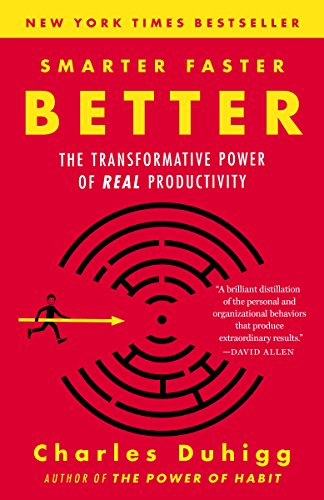There is a growing movement in businesses worldwide to switch to a four-day workweek. It sounds like a great idea for employees, and according to many companies who have tried it, there are numerous benefits for all. So, let’s take a quick look at seven companies that have switched to the four-day workweek and find out what they have learned.

Smarter Faster Better
by Charles Duhigg
⏱ 15 minutes reading time
🎧 Audio version available
Elephant Ventures
This New York-based software company decided to try a four-day working week in August 2020 to prevent employee burnout and help people manage their work-life balance more effectively. The company had already switched to remote working in March, and the feedback from employees was overwhelmingly positive regarding the four-day working week.
Elephant Ventures has kept to the 40-hour working week, so employees work four 10 hour days a week. Although this sounds like a lot, feedback from employees has been generally positive. Everyone likes the extra day off a week, and they return to work feeling rested and energized. This is despite many employees struggling with the longer days initially before they adjusted to the new regime.
According to company president Art Schectman, condensing five days’ worth of hours into a four-day workweek has improved productivity and company morale. As a result, company employees have voted to keep with this system permanently.
Microsoft Japan
Microsoft tested the four-day workweek in its offices in Japan and found that the month-long experiment carried out over August 2019 had many positive benefits.
The 2,300 workforces were given Fridays off with no loss of pay, yet productivity increased by 40%, and staff members reported improved morale and happiness. Additional benefits included reduced unplanned leave by 25% during the trial period, and electricity consumption went down by 23%.
Despite the proven successes of the trial, Microsoft Japan only initiated the four-day week on a trial basis. There are no plans to make these changes permanent, and many employees have voiced concerns over working fewer hours. A lot of this comes down to the Japanese work ethic. Japan has an extreme work culture, so unless the Japanese government brings the four-day working week into law, it seems unlikely to be adopted permanently by individual companies.
RadioActive PR
Radio Active is a PR company based in the UK. The company initiated the four-day working week back in 2018, and the concept is still enshrined in the company ethos.
Within the first year, the benefits were enormous. Rick Leigh, the company founder, reported a 70 % increase in company turnover, improved staff morale, fewer days off, and a spike in recruitment. In addition, employees managed to achieve a more sustainable work-life balance. For the company, the reduced working hours have not had a negative effect on company growth or expansion.
The four-day week has also reduced sick leave from 1.3 days per person to 0.5 days. However, the system is not without difficulties.
According to Rick Leigh, the biggest challenge is to grow the company while reducing hours, so it requires constant vigilance to ensure that quality is maintained. In addition, he has had to reassure clients that the shorter workweek would not have a negative impact on performance.
Rick Leigh says that because the company is based outside London, their profit margins are higher than many capital-based agencies, so the company could afford to take this risk, whereas not all similar companies could. However, he advises other companies to trial the four-day scheme if they can. This is because it does offer so many benefits, and if it does not work, just switch back.
Target Publishing
Target Publishing is a British media company that struggled throughout the pandemic, so switching to a four-day week helped save money on wages, as a staff was forced to take a 20% pay cut. However, total wages were reinstated after three months under this regime, and the company finances were back on track.
David Cann, the company director, also opted to stick with the four-day working week of 30 hours. He has reported that productivity has improved, motivation is better, and profits are up. “It’s a great incentive for everyone to complete work by Thursday, knowing that Friday is now an extended weekend, every week.”
Awin
Awin is a tech company based in Berlin. When the COVID pandemic hit, the 1,000 employees had to shift to working remotely. At the same time, sales went through the roof as a business with online retailers increased due to the lockdown.
To relieve some of the pressure on staff, Awin started to give sales staff Friday afternoons off, which proved to be so successful in terms of productivity, employee engagement, and improved sales figures that they have switched to a four-day working week for the entire company.
According to company CEO Adam Ross, this has proved successful. The improved morale enables better quality work as employees “find ways to work smarter, and they’re just as productive.”
Buffer
The social media company, Buffer, has relied on remote working since the beginning of 2020, and they moved to a four-day workweek in May 2020, initially as a six-month trial. Again, the results have been wildly successful.
Output and productivity have improved across the board, and reported stress levels have decreased. Employees report feeling more engaged and happy, and overall, the company intends to continue with this new schedule. However, there are provisos.
The management team is monitoring the situation. It is predicted that, with the company’s expansion, goals will still need to be met, and employees may be asked to work Fridays to reach targets. That said, the company is confident that workers will be able to rise to the challenge and that Buffer will be able to maintain its four-day working week in the future.
Unilever
International manufacturing giant, Unilever, is looking into adopting the four-day week. The company is looking to trial the new system in their New Zealand operation to roll out the four-day working week worldwide if it proves successful. The catalyst was the move to remote working due to the pandemic, as old working methods were seen to be outdated.
So far, figures are not available, but it could be a game-changer if the four-day experiment achieves the same success seen in most companies who have adopted it. Nick Banks, managing director of Unilever New Zealand, said the goal of the test was to “measure performance on output, not time.”
I’ve only heard about the success stories. How common is it that the four-day workweek doesn’t pan out?
What Is Snapreads?

With the Snapreads app, you get the key insights from the best nonfiction books in minutes, not hours or days. Our experts transform these books into quick, memorable, easy-to-understand insights you can read when you have the time or listen to them on the go.


